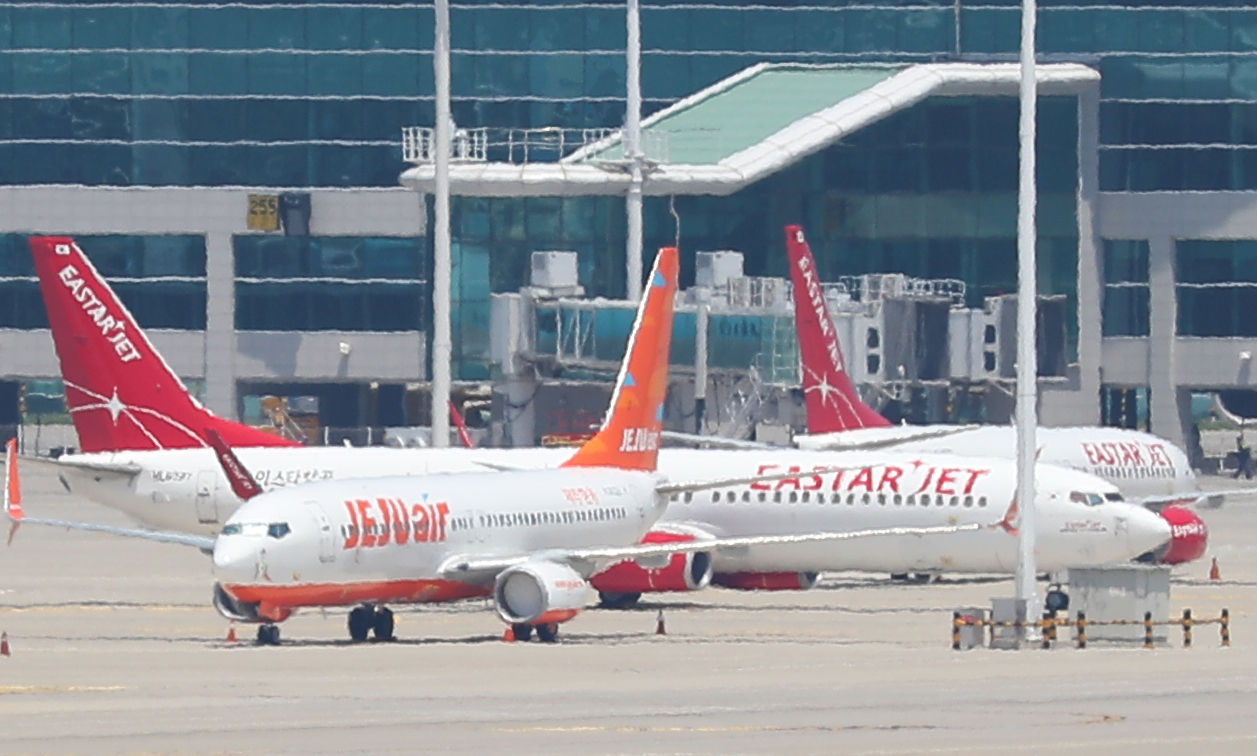Jeju Air pulls plug on Eastar Jet with nowhere to go
High-profile M&A deal falls apart, further dampens mood of aviation industry
By Yim Hyun-suPublished : July 23, 2020 - 16:34

After months of negotiations and trading barbs, Jeju Air finalized its decision Thursday to scrap its plans to purchase Eastar Jet -- a decision that Jeju said was inevitable amid uncertainties, but was detrimental to the Eastar Jet that now faces real risk of bankruptcy.
“Despite the government’s willingness to support and mediate, the level of uncertainty facing Jeju Air was too high to move forward with the acquisition,” the airline said in a statement.
Jeju Air, South Korea’s largest low-cost carrier and which is owned by cosmetics and health care conglomerate Aekyung Group, added that it was regrettable that the deal didn’t come to fruition.
Later in the day, Jeju Air CEO Kim E-bae sent a letter to employees saying, “While we leave behind the great challenge of joining with Eastar Jet, the reality that faces us continue to be uncertain and harsh.” Kim, who took the helm of Jeju Air last month, said he will continue to work on maintaining the financial health of the business through state subsidies, recapitalizations and cost cuts.
Eastar Jet, in response, accused the LCC of “breaching its stock purchase agreement.”
“We urge Jeju Air to implement the stock purchase agreement, and the responsibility lies with Jeju Air in the event of breach or nonfulfillment of agreement,” Eastar Jet said Thursday in a message to reporters. The troubled airline also said it will take all possible steps to save the company and its 1,600 staff, including over 200 pilots.
With the collapse of the deal, up to 2,000 job losses are feared when including workers of the airline’s partner firms, dealing a further blow to the aviation industry amid the coronavirus pandemic.
Industry watchers said a legal battle between the two airliners appears inevitable. The Transport Ministry, for their part, urged Eastar Jet to come up with a plan B.
As it could take two to three years for the industry to recover, Korea Aerospace University professor Hurr Hee-young said the collapse of the deal is not good news.
“If (Eastar Jet) defaults on its debt and it leads to bankruptcy and liquidation, it will set a precedent with more airlines to follow,” he said.
“Seeing how unlikely it seems (for Eastar Jet) to recover once it enters court receivership with no alternatives, this seems to be the end of Eastar Jet,” the professor added.
Hurr, however, said Eastar Jet’s poor management had been an issue long before the pandemic. Eastar Jet was established in 2007 by Lee Sang-jik, who has since become a representative in the National Assembly for the ruling Democratic Party of Korea.
The airline’s total capital has been impaired every year since 2013, totaling 63.2 billion won ($52.79 million) at the end of 2019.
The latest development marks the culmination of a series of events surrounding the high-profile buyout deal that goes back nearly seven months.
In December, the two airlines signed a memorandum of understanding on a buyout.
In March, the two reached a stock purchase agreement for Jeju Air to own 51 percent shares of Eastar Jet at a reduced price of 54.5 billion won, despite a preliminary deal putting the price at 69.5 billion won.
The deal drew significant attention as it could have been the first of its kind between two airlines in Korea, especially at a time when airlines across the world have struggled to stay afloat.
But friction between the two airlines grew in recent weeks over their stances on issues such as corporate restructuring and unpaid wages. Jeju Air criticized Eastar Jet for “not being diligent” about meeting prerequisites, including clearing its debt.
By Yim Hyun-su (hyunsu@heraldcorp.com)
“Despite the government’s willingness to support and mediate, the level of uncertainty facing Jeju Air was too high to move forward with the acquisition,” the airline said in a statement.
Jeju Air, South Korea’s largest low-cost carrier and which is owned by cosmetics and health care conglomerate Aekyung Group, added that it was regrettable that the deal didn’t come to fruition.
Later in the day, Jeju Air CEO Kim E-bae sent a letter to employees saying, “While we leave behind the great challenge of joining with Eastar Jet, the reality that faces us continue to be uncertain and harsh.” Kim, who took the helm of Jeju Air last month, said he will continue to work on maintaining the financial health of the business through state subsidies, recapitalizations and cost cuts.
Eastar Jet, in response, accused the LCC of “breaching its stock purchase agreement.”
“We urge Jeju Air to implement the stock purchase agreement, and the responsibility lies with Jeju Air in the event of breach or nonfulfillment of agreement,” Eastar Jet said Thursday in a message to reporters. The troubled airline also said it will take all possible steps to save the company and its 1,600 staff, including over 200 pilots.
With the collapse of the deal, up to 2,000 job losses are feared when including workers of the airline’s partner firms, dealing a further blow to the aviation industry amid the coronavirus pandemic.
Industry watchers said a legal battle between the two airliners appears inevitable. The Transport Ministry, for their part, urged Eastar Jet to come up with a plan B.
As it could take two to three years for the industry to recover, Korea Aerospace University professor Hurr Hee-young said the collapse of the deal is not good news.
“If (Eastar Jet) defaults on its debt and it leads to bankruptcy and liquidation, it will set a precedent with more airlines to follow,” he said.
“Seeing how unlikely it seems (for Eastar Jet) to recover once it enters court receivership with no alternatives, this seems to be the end of Eastar Jet,” the professor added.
Hurr, however, said Eastar Jet’s poor management had been an issue long before the pandemic. Eastar Jet was established in 2007 by Lee Sang-jik, who has since become a representative in the National Assembly for the ruling Democratic Party of Korea.
The airline’s total capital has been impaired every year since 2013, totaling 63.2 billion won ($52.79 million) at the end of 2019.
The latest development marks the culmination of a series of events surrounding the high-profile buyout deal that goes back nearly seven months.
In December, the two airlines signed a memorandum of understanding on a buyout.
In March, the two reached a stock purchase agreement for Jeju Air to own 51 percent shares of Eastar Jet at a reduced price of 54.5 billion won, despite a preliminary deal putting the price at 69.5 billion won.
The deal drew significant attention as it could have been the first of its kind between two airlines in Korea, especially at a time when airlines across the world have struggled to stay afloat.
But friction between the two airlines grew in recent weeks over their stances on issues such as corporate restructuring and unpaid wages. Jeju Air criticized Eastar Jet for “not being diligent” about meeting prerequisites, including clearing its debt.
By Yim Hyun-su (hyunsu@heraldcorp.com)


















